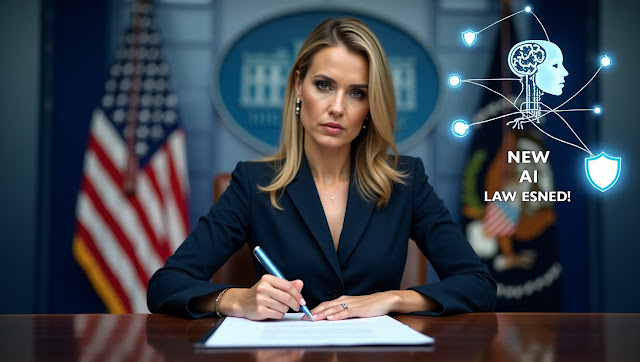🇺🇸 President Signs New AI Regulation Law: A New Era of Responsible Innovation Begins
Published on: July 15, 2025
By: Neeraj News Team
📌 Introduction
In a major move towards balancing technological progress with public safety, U.S. President Kamala Harris has officially signed the Artificial Intelligence Safety and Innovation Act (AISIA) on July 15, 2025. This landmark legislation marks a new chapter in the way the United States will govern the development and use of artificial intelligence.
🤖 Why Was This AI Law Needed?
Artificial Intelligence has become a part of our daily lives — from chatbots and recommendation engines to autonomous vehicles and healthcare diagnostics. However, rapid growth without proper ethical and legal oversight raised concerns about:
-
Job displacement
-
Data misuse and privacy invasion
-
Fake content generation (deepfakes, misinformation)
-
Biased or unsafe algorithms
-
Lack of transparency from big tech companies
After months of public hearings, expert panels, and bipartisan debate, the AISIA bill was passed in Congress and finally signed into law on Tuesday.
📃 Key Features of the AI Regulation Law
The Artificial Intelligence Safety and Innovation Act includes several strong yet balanced measures:
1. 🔍 Mandatory Transparency
-
All AI companies must disclose how their models are trained and what kind of data is used.
-
Platforms using AI must label AI-generated content clearly to avoid public confusion.
2. 🛑 Ban on Harmful Use-Cases
-
Surveillance AI, deepfake tech for political use, and autonomous weapon systems are now restricted or banned under specific conditions.
3. 📊 AI Safety Testing
-
Companies must conduct pre-release safety testing with the National AI Oversight Committee (NAIOC).
-
Testing will focus on bias, accuracy, misuse risks, and cybersecurity vulnerabilities.
4. 👥 AI Ethics Board Formation
-
An independent AI Ethics Board will be created to guide policy, research, and monitor compliance.
5. 💼 Funding for AI Startups
-
$5 Billion in federal funding will be offered to ethical AI startups and research labs, ensuring innovation doesn’t slow down.
🏢 How Tech Giants Are Reacting
Companies like Google, OpenAI, Meta, and Microsoft have responded positively but cautiously. While they support safer AI, they also raised concerns about bureaucratic delays in innovation.
“We welcome the focus on responsibility, but the regulations must not stifle creativity and speed,” said a Google AI spokesperson.
📈 Impact on Users & Developers
For general users:
-
You’ll now see AI labels on content, especially on social media and websites.
-
Your privacy rights will be better protected with opt-out options for AI data usage.
For developers:
-
You’ll need to register large-scale AI models, run them through bias tests, and report intended use-cases.
🌍 How This Affects the World
The U.S. move is likely to inspire similar AI laws worldwide, especially in Europe, Canada, and Australia, which are already considering similar bills. The law could also act as a blueprint for global cooperation on ethical AI usage.
📣 Conclusion: A Step Toward Safer AI
The signing of the Artificial Intelligence Safety and Innovation Act shows that the U.S. is taking AI seriously — not just as a tool for profit, but as a force that can reshape society. With this law, the government hopes to create a future where AI is transparent, safe, and fair for all.

